|
|
|
Sort Order |
|
|
|
Items / Page
|
|
|
|
|
|
|
| Srl | Item |
| 1 |
ID:
138929


|
|
|
|
|
| Summary/Abstract |
Recent developments in globalization, education, and technology suggest exciting possibilities for cross-national active teaching and learning in international studies. This paper reviews scholarship on the potential for systematic and intentional cross-national pedagogical innovations in international studies. Three critical themes are identified and explored: culture and cross-national education, collaboration across contexts, and the need for systematic assessment. Each plays an important role in facilitating effective active teaching and learning cross-nationally. A broader examination of the opportunities and challenges of cross-national education in international studies suggests guidelines for a systematic, collaborative cross-national approach to an emerging active teaching and learning research agenda.
|
|
|
|
|
|
|
|
|
|
|
|
|
|
|
|
| 2 |
ID:
109956
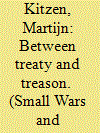

|
|
|
|
|
| Publication |
2012.
|
| Summary/Abstract |
Recent counterinsurgency experiences in Iraq and Afghanistan have demonstrated that the local operating environment often is dominated by indigenous power-holders. As counterinsurgents seek to establish control over the local population, collaboration with these agents has become an essential aspect of contemporary counterinsurgency. Although the practice of constructing collaborative relationships with indigenous power-holders might be perceived as unconventional by today's counterinsurgents, the approach itself goes back to the colonial era in which modern counterinsurgency has its roots. This article explores the dynamics, benefits, and dangers of collaborative relationships with indigenous power-holders by analysing an infamous episode in Dutch colonial history, the case of the collaboration between Dutch colonial authorities and warlord Teuku Uma during the Aceh War (1873-1913). This relationship ended in disaster for the Dutch as Uma departed their side at the moment he had become their pivotal asset in the local political landscape. The article explains that the Dutch succeeded to co-opt Uma, but failed to control him as they lacked the will and means to do so. Furthermore this case study provides an insight in the way the Dutch colonial authorities dealt with the complex process of intelligence-gathering in a fragmented indigenous society.
|
|
|
|
|
|
|
|
|
|
|
|
|
|
|
|
| 3 |
ID:
090210
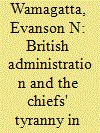

|
|
|
|
|
| Publication |
2009.
|
| Summary/Abstract |
This article argues that the chiefs' tyranny in early colonial Kenya had its roots in the British administrative style since the Government needed strong-handed local leaders to enforce its unpopular laws and regulations. That was why the chiefs got away with their tyranny because the Government condoned it to a certain extent. They also got away with it because of the alien nature of their positions, their duties and their people inadvertently condoning it. The first generation of chiefs from Kiambu district is used as a case study to illustrate what was happening in the colony during the period under study.
|
|
|
|
|
|
|
|
|
|
|
|
|
|
|
|
| 4 |
ID:
104038


|
|
|
|
|
| Publication |
2011.
|
| Summary/Abstract |
While governments in sub-Saharan Africa work to provide in-country relief for the HIV/AIDS crisis, much health care and infrastructure comes from local or international non-governmental organizations (NGOs). The literature on NGOs suggests that collaboration increases their efficacy. Many non-Catholic NGOs do not work collaboratively with Catholic NGOs on HIV/AIDS, though the Catholic Church has rich and varied resources at its disposal for relief work. Observers often characterize the incompatibility of Catholic and non-Catholic NGOs as tactical, especially with regard to condom use. However, divergent issue framing is a critical and more fundamental distinction between the two groups. Contrasting the Catholic Church's unique spiritual frame with the scientific frame of many non-Catholic NGOs highlights the epistemological and teleological differences between the two. Reconciling these differing approaches, or finding ways to cooperate despite them, is a key element of promoting broader NGO collaboration on HIV/AIDS relief work. This theoretical analysis suggests directions for future empirical research.
|
|
|
|
|
|
|
|
|
|
|
|
|
|
|
|
| 5 |
ID:
187348


|
|
|
|
|
| Summary/Abstract |
Transfer of technology (TOT) is a contentious issue in the international defence trade. In 2019 it was estimated to form at least 40%, or $123 billion USD, of total international defence trade. Whilst purchasing nations set requirements for TOT within their industrial participation (IP) policies, there is often a mismatch between the scale and type of technology suppliers can offer and the buyer’s technological absorption capability (TAC). This persistent tension between ambition and reality frequently strains the buyer-supplier relationship. Thus, understanding how TAC can be enhanced is of vital importance. This paper defines TAC in the international defence acquisition and offsets context and determines the factors for successful TAC. The paper focusses on the potential challenges for successful TAC and offers recommendations on how to enhance TAC. This research is limited to the context of Southeast Asia. The respondents consist of industry, government and academics who operate in the Southeast Asian defence and security sector.
|
|
|
|
|
|
|
|
|
|
|
|
|
|
|
|
| 6 |
ID:
170012
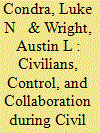

|
|
|
|
|
| Summary/Abstract |
What affects civilian collaboration with armed actors during civil war? While theory and evidence confirm that harm by armed actors influences when and with whom civilians collaborate, we argue that collaboration is also a function of civilians’ perceptions of armed actors’ efforts to minimize collateral casualties. We test this argument using a series of nationwide surveys of Afghan civilians conducted quarterly between 2013 and 2015. Our data record civilian willingness to report roadside bombs to government authorities and perceptions of government and Taliban efforts to minimize civilian harm. Civilians are less (more) willing to collaborate with the government when they perceive the government (Taliban) carelessly using force, even after accounting for political sentiment, local security conditions, and a range of additional confounding factors. Moreover, our evidence suggests that perceived carelessness in the rival’s area of control influences collaboration. We discuss how these empirical results inform broader literatures on collaboration, conquest, occupation, and control.
|
|
|
|
|
|
|
|
|
|
|
|
|
|
|
|
| 7 |
ID:
083243
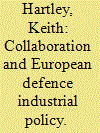

|
|
|
|
|
| Publication |
2008.
|
| Summary/Abstract |
Traditionally, the EU has protected its national defence industries (through Article 296). There are now policy initiatives to create a European defence equipment market (EDEM) and a European defence technology and industrial base (EDTIB). This article assesses these policy initiatives. It considers the EU as an inefficient defence market and also considers the opportunities for creating an efficient defence industrial policy. Collaboration has been a distinctive feature of European defence industrial policy and a case study of the Typhoon is presented and assessed. Finally, criteria for assessing the strengths and weaknesses of the EDTIB are presented.
|
|
|
|
|
|
|
|
|
|
|
|
|
|
|
|
| 8 |
ID:
113324
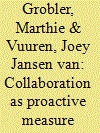

|
|
|
|
|
| Publication |
2012.
|
| Summary/Abstract |
The international scope of the Internet and wide reach of technological usage requires cyber defence systems to intersect largely with the application and implementation of international legislation. One of the problems associated with the technological revolution is that cyber space comprises complex and dynamic technological innovations to which no current legal system is well suited. A further complication is the lack of comprehensive treaties facilitating international cooperation with regard to cyber defence. The result is that many countries will not be properly prepared or adequately protected by legislation in the event of a cyber attack on a national level.
The article investigates this problem by touching on the influence that cyber defence has on the international position of the government. The article addresses the principles of cyber security and cyber warfare acts, and briefly touches on cyber security collaboration efforts for South Africa. The authors are of the opinion that Africa does not follow a coordinated approach in dealing with cyber security, and that the various structures that have been established to deal with cyber security are inadequate to deal with issues holistically. To work towards such a co ordinated approach, it is suggested that specific interventions be developed to address cyber crime. This approach should create and maintain a partnership or collaboration between business, government and civil society. The authors are of the opinion that unless these spheres of society work together, Africa's efforts to ensure a secure cyber space may be compromised.
|
|
|
|
|
|
|
|
|
|
|
|
|
|
|
|
| 9 |
ID:
151243
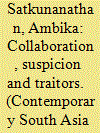

|
|
|
|
|
| Summary/Abstract |
This paper explores the manner in which the post-war strategy of militarisation, in particular surveillance and the recruitment of informants used by the government to control the conflict-affected population, has impacted Tamil society in the North. This strategy, which mirrored strategies used by the Liberation Tigers of Tamil Eelam in areas under their control, created suspicion, deepened existing intra-community cleavages and hampered efforts to rebuild trust and social relations in post-war Northern Sri Lanka. Despite this, communities found ways to construct alternate, albeit limited, spaces of trust to foster intra-community bonds.
|
|
|
|
|
|
|
|
|
|
|
|
|
|
|
|
| 10 |
ID:
134024


|
|
|
|
|
| Publication |
2014.
|
| Summary/Abstract |
Collaborative defence projects have been a distinctive feature of European defence industrial policy. This article focuses on whether the number of partner nations in international collaborative defence and aerospace programmes is a source of inefficiency. It appears that there is not a simple linear relationship. Two nation collaborations can be efficient, but conventional wisdom assumes that inefficiencies emerge with more than two partner nations. Inevitably, data problems made what appears to be a simple hypothesis difficult to test. The major result is that there is no evidence that efficiency as measured by development times is adversely affected by the number of partner nations. A limited sample regression and a comparison of Airbus vs. Boeing shows a similar conclusion.
|
|
|
|
|
|
|
|
|
|
|
|
|
|
|
|
| 11 |
ID:
160498
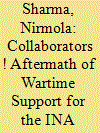

|
|
|
|
|
| Summary/Abstract |
This article discusses the plight of the Indian community in China after the World War II. During the World War II, a sizeable number of Indian immigrants in China had been mobilised under the banner of the Indian National Army (INA), which was fighting for freedom from British colonial rule in alliance with Japan. This article seeks to understand the complex problems faced by the Indians in China in the aftermath of the War both because of the general dislocation they had suffered on account of war and occupation, and also because of their active or passive participation in a movement seen as ‘collaborationist’. It looks at how, for the British, Chinese and even Indian authorities, the issue of their status as ‘collaborators’ coloured the humanitarian issue of providing relief to a severely afflicted community. It also attempts to show how the wartime political activities of Indians in China not only had immediate consequences for them but also in some cases had an afterlife, which lasted for quite a few years after the War.
|
|
|
|
|
|
|
|
|
|
|
|
|
|
|
|
| 12 |
ID:
148030
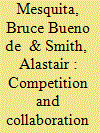

|
|
|
|
|
| Summary/Abstract |
Despite the extensive empirical and theoretical research into foreign aid, there remains little or no formal analysis of aid giving in a competitive donor environment. We endeavor to fill this lacuna with both a model and empirical analysis of aid-for-policy deals with rival aid donors. The model indicates that a dominant donor captures all the surplus from any deal. We test several hypotheses that follow from the model. We demonstrate that the United States paid less (in constant dollars) and gained more in policy terms through aid before the Soviet Union became a significant aid player. Once the Soviet Union became a player in the international aid arena, the United States paid more for aid and got less by way of security concessions from recipients.
|
|
|
|
|
|
|
|
|
|
|
|
|
|
|
|
| 13 |
ID:
072444
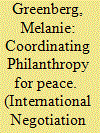

|
|
|
| 14 |
ID:
069862


|
|
|
| 15 |
ID:
148637
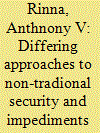

|
|
|
| 16 |
ID:
130903
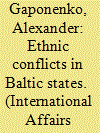

|
|
|
|
|
| Publication |
2014.
|
| Summary/Abstract |
To my mind, the European Union - EU was planned as strictly an economic union and its founder did not plan right from the start to form a single European community of nations or even a European civilization of a higher level.
|
|
|
|
|
|
|
|
|
|
|
|
|
|
|
|
| 17 |
ID:
142259
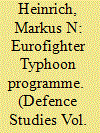

|
|
|
|
|
| Summary/Abstract |
This article analyses the economic and industrial implications of the Eurofighter Typhoon programme. In an era of progressive reductions in European defence expenditure and exponentially increasing sophistication and cost of modern weapon systems development, European nations have pooled their resources for this major defence project. Although being founded on a sound concept, the Eurofighter programme has faced difficulties in the form of cost overruns, and the aircraft has been troubled by system defects and shortcomings in its air-to-ground capabilities, the combination of which has earned it critics, adversely affected its export record and cast doubt over its future. However, the Typhoon is a highly capable fighter, and sensor and weapons upgrades are increasingly bringing it closer to fulfilling its multi-role potential. The programme’s importance also goes beyond the aircraft itself and the capability its possession affords, as it supports a large number of highly skilled jobs and therefore has far-reaching implications for Europe maintaining the conditions and skills necessary for a competitive and independent indigenous fighter-aircraft manufacturing capacity.
|
|
|
|
|
|
|
|
|
|
|
|
|
|
|
|
| 18 |
ID:
130904
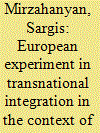

|
|
|
|
|
| Publication |
2014.
|
| Summary/Abstract |
The theme is one for political science rather than cultural studies. To talk about supranationality and not to talk about identity is impossible, because these concepts are interrelated. Supranationality is a terms that has recently comes into vogue in the mainstream domestic socio-political discourse. This is due primarily to the perspective of the creation in the post Soviet space of a new integration construct the European Union.
|
|
|
|
|
|
|
|
|
|
|
|
|
|
|
|
| 19 |
ID:
114016
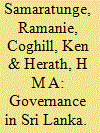

|
|
|
|
|
| Publication |
2012.
|
| Summary/Abstract |
This article applies complex evolving systems theory (CES) to investigating the governance factors affecting rebuilding in the wake of the 2004 tsunami in Sri Lanka. It also examines the crucial processes of co-operation between the various governance actors (public, market and civil society) in the aftermath of the disaster. The main focus is on the horizontal integration in the process of service delivery at the district level during the rebuilding stage, and on explaining the nature and extent of collaboration in the delivery of services needed for the survivors to build their new lives. Our observations suggest that influence, incentives and the power of dominant groups remain highly relevant to the outcomes and that the socio-political system within which they operate is dynamic. Governance as a whole has become a playing field for dominant stakeholder groups both within and outside the government. The study demonstrates the value of CES in improving the understanding of complex governance in the context of a crisis.
|
|
|
|
|
|
|
|
|
|
|
|
|
|
|
|
| 20 |
ID:
144924
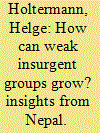

|
|
|
|
|
| Summary/Abstract |
How can insurgent groups that are militarily far weaker than the state survive and grow? Influential accounts drawing on Kalyvas' “control-collaboration” model argue that limited state reach can make this possible by allowing rebel groups to carve out pockets of control where they can elicit collaboration. I suggest that this account is inadequate. Even states with limited reach are likely to transfer sufficient forces to rebel-affected areas to establish at least partial control. Weak rebels therefore often face the challenge of building capacity without local control to begin with. I identify two broad factors that can make this feasible: first, strong pre-existing rebel networks, which facilitate collaboration through solidarity, norms of reciprocity, and social incentives; and second, counterinsurgency policies and practices that fail to exploit the opportunities that control offers for incentivizing collaboration and shaping political preferences. These arguments are grounded in a fieldwork-based case study of insurgency processes in a hamlet of Rolpa, Nepal.
|
|
|
|
|
|
|
|
|
|
|
|
|
|
|
|
|
|
|
|
|